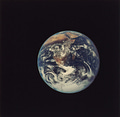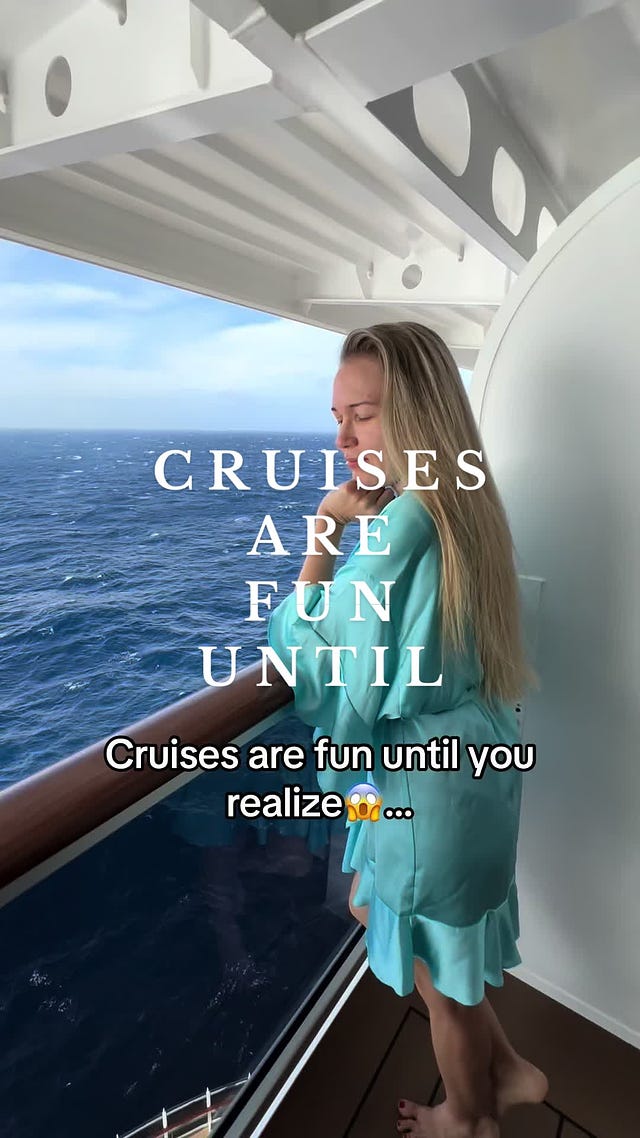
I don’t think much about ships, especially not cruise ships. I live in the middle of the country (Louisville, Kentucky), so that’s part of it. But when I lived near the ocean, in Maine and then Vancouver, I preferred vessels that were a little closer to the ocean itself, like sea kayaks. I’ve only seen cruise ships at a great distance, and I’ve never set foot on one. I’ve always harbored the environmentalist’s standard disdain for cruise ships, and perhaps I’ve imagined on some level that if I didn’t think about them, they would disappear.
But somehow, over the past several weeks, cruise ships have floated into my imaginative horizon again and again.
A couple of weekends ago, I ended up in a very long conversation with someone who’s been on several cruises. I found myself suddenly curious to learn why people are drawn back to cruises, again and again. I asked about everything: the cost, the child care, the food, the drinks, the beds, the bathrooms, the soundscape, the fashion, the entertainment, the social environment, how to waste time. Later that night, I ended up going down a TikTok cruise ship rabbit hole.
Incidentally, in one of my classes the following week—during a discussion of liberation theology and inequality in America—my students ended up discussing cruise ships. A significant number of them had been on cruise ships, and even had family members (such as a retired and widowed grandfather) who were functionally living on cruise ships. One of them had thought, extensively, about the many ways that economic inequality shows up on the cruise ship (whether or not your room has a window or a balcony, where you’re allowed to pass leisure time, what sort of “free” merchandise is on offer for you, how you interact with local people during your landed “excursions”). I found the conversation fascinating and, like cruise ships themselves, a little dystopian.
This week, as I’ve been on spring break and spending some luxury time on writing projects, I’ve been thinking more about space. Outer space. More specifically, the earth from outer space. One of the books I’ve been reading is about Spaceship Earth: the metaphor that emerged in the wake of the Apollo 8 photos of the earth, taken from the surface of the moon. The author, Sabine Höhler, is an environmental historian who argues that this metaphor was operative from about 1960 to 1990, at which time the myth had essentially lived out its usefulness.
But, as I pondered the myth of our home—planet Earth—as a vessel in space, I started to wonder if, perhaps, the planet has become a kind of mythical galactic cruise ship.
Spaceship Earth
The figure of Spaceship Earth, in Höhler’s analysis, is a myth. She dismisses the common assumption that a myth is a form of fiction. “Myths are culturally shared narratives that describe collective realities meaningfully,” she writes. The myth of Spaceship Earth appeared, in very different ways, in popular culture and in various intellectual projects. It didn’t always go by the name of Spaceship Earth. But there were many ways in which the earth, during this time period, came to appear as a special kind of ship.
What the figure of Spaceship Earth mythically expressed was, in essence, two key things. First, it was a figure that illuminated what was becoming increasingly clear through both global politics and the environmental movement: like a ship our planet is small, finite, fragile, and limited. It’s a little blue marble floating in the great sea of space. But a spaceship is a special kind of ship: one that’s almost unimaginably technical. So the myth of the earth as spaceship also expressed burgeoning hopes for how humans might technoscientifically manage the conditions of life on the planet. It was both a “neo-romantic image” for early environmentalists as well as a vision for a “managed economy of nature”.
It’s the neo-romantic dimensions of the myth that are the most compelling to me, of course. And Höhler discusses, at length, the way that Spaceship Earth functioned as a kind of ark for the modern era: a figure of hope and salvation. “At a time when the earthly environment seemed like a paradise in jeopardy,” Höhler writes, “the spaceship, like the biblical ark, held out the hope of preserving life in all its diversity” and perhaps even “settling it elsewhere.”
It’s easy, perhaps, to romanticize a vision of earthly salvation like this (especially if you don’t read it as an explicit vision of space colonization). But Höhler also points out that rigid hierarchies and forms of exclusion are central to ship narratives. Even the biblical one. Authority, order, and organization become key elements of life on a fragile and risky ship. In her 1966 book Spaceship Earth, Barbara Ward writes, in a cautionary tone, “in such a close community, there must be rules for survival.”
Despite this, the figure of the ship continues to be idealized as a journey-bound vessel. Höhler cites, for instance, the philosopher Slavoj Žižek, speaking in a documentary called The Possibility of Hope. “What I like is that the solution is the boat,” he says. “What is the definition of the boat? It’s that it doesn’t have roots. It’s rootless. It floats around. That’s the solution.” He’s embracing, in other words, the condition of being finite, precarious, liminal in time and space. “We must really accept how we are rootless. This is, for me, the meaning of this wonderful metaphor, boat. Boat is the solution, boat in the sense of: you accept rootless, free floating. You cannot rely on anything.”
Cruise Ship Earth
I, too, have tried to embrace the inevitable and inescapable feelings of finitude, precarity, and liminality. But I find Žižek’s celebration of rootlessness mildly offensive. It reminds me a bit of Gilles Deleuze and Félix Guattari’s anti-tree screeds that were very popular I was in graduate school. I understand the antipathy toward overused, even oppressive, figures from western thought traditions that overdetermine the way we think today. And yet, I also resent attacks on trees, even if they’re just ideological.
And it was Žižek who ultimately made me start thinking about cruise ships. Everything that he’s celebrating about the wonderful metaphor of the boat is embodied, in some way, in the cruise ship.
The cruise ship is rootless, and floating. And there’s even a joyful kind of nihilism in the figure of the cruise ship. There’s no better place to embrace meaninglessness and purposelessness than a cruise ship. Cruise ship travel is travel for a world where nothing really matters anymore: actual cities, and actual places, have become uninteresting. Cruise ships are like fantastic, floating, all you can eat and drink cities at the edge the world: party boats for the end of it all. But, of course, cruise ships—in their wonderful rootlessness—are part of what appears to be ending it all. Cruise ships are the worst polluters in the travel industry—worse, even, than airplanes. Cruise ships burn diesel fuel, and leak it into the ocean (though there are now cruise lines that claim to have zero emissions). They dump thousands of gallons of raw sewage and gray water into the ocean every day. Their ballast water facilitates the transfer of invasive species. They burn solid waste, and dump even more of it into the ocean. And the industry flagrantly dismisses environmental regulations.
So what would it mean to think about the earth as a mythical, galactic cruise ship? I suppose it would mean that the earth is something like a fantastic, rootless, diesel burning, ocean eviscerating, all you can eat and all you can drink party boat floating and rootless in time and space? It’s a hierarchically ordered, inequality exacerbating, waste producing, mobile consumption machine? And we’re all stuck on it together, as we float in the abyss.
Submarine Earth
Needless to say, I don’t like this mythical figure: Cruise Ship Earth. But despite all of this nautical critique, I will admit that there’s something intuitively appealing about the myth of the earth—our home—as a vessel of sorts. We are on a journey—both individually and collectively. And the earth is what carries us, as we go.
Ultimately, the sort of boat we’re on would matter, wouldn’t it? If we have to think about the earth as a vessel, I think I’d prefer to imagine it not as a spaceship, or a cruise ship, or even a creaky, primal, wooden ark, but as a submarine. I’d rather imagine the earth as a ship that’s traveling below the surface of the water: made to float in that mysterious galactic deep.
Let’s ignore the fact that submarines were developed for the purpose of combat, and espionage. No metaphor is perfect! And I’d rather not think of the earth as a vessel built for something militant. If we can forget this, maybe we can think about the earth as a fragile, and yet tough, little vessel for navigating mysterious otherworlds—mysterious underworlds—that we’re not necessarily built to survive in. A vessel built for travel, protection, and survival, in the deep. I suppose that this is, in the end, what I feel like we’re doing when I see those photographs of our planet hovering in complete darkness. Earth glows back at me, with a soothing blue-green warmth: my home, my shelter, my protector.





